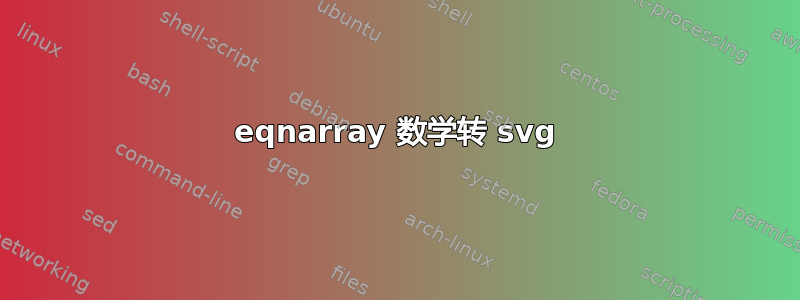
我想编写一个 perl 处理器,从 html 图像中过滤方程式并为其创建 svg 替换,以便我的方程式可以在 epub 和主流浏览器中很好地显示。(我知道文本浏览器和电子邮件客户端会很常见。)
思考
<html>
<body>
<h1>Visible</h1>
<p>I can see this and change its size in my browser and in epub.
<pre class="math">
y &=& \frac{\sqrt{x}}{z} \\
&&+\frac{\sqrt{z}}{\mathtt{myvar}} \nonumber
</pre>
</body>
</html>
我可以轻松解析预内容。然后我可以将它们粘贴到 latex 文件中。
\documentclass[12pt]{article}
\RequirePackage{charter}
\RequirePackage[mdbch,ttscaled=true]{mathdesign}
\usepackage{microtype}
\usepackage[english]{babel}
\begin{document}
\begin{eqnarray}
y &=& \frac{\sqrt{x}}{z} \\
&& + \frac{\sqrt{z}}{\mathtt{myvar}}
\end{eqnarray}
\end{document}
大概,然后我跑
pdflatex -output dvi file.tex ; dvisvgm file.dvi .
我使用 dvisvgm 的原因是 texlive 不包含 pdfsvgm,而 pdf2svg 让我害怕,因为它引用了 poppler 和 cairo(我希望我的方程式保持完全呈现/可缩放)。但是,我确实需要运行的结果文档
1. 我如何让 Latex 创建一个仅包含方程式边界框的页面?
2. 是否有任何推荐的其他参数我应该交给 dvisvgm 以实现我的目的?(例如,精确?)。
此后,我想将其编码回我的 html 源代码中。大概,现在我想做类似的事情
<html>
<body>
<h1>Visible</h1>
<p>I can see this and change its size in my browser and in epub.
<svg>
... (whatever I see in file.svg)
</svg>
</body>
</html>
3. 这是解决问题的正确方法吗?还是我在这里犯了一个错误?
感谢帮助。
问候,
/iaw
PS:如果有人读到这篇文章,链接位于http://www.latex2html.org/node2.html好像坏了。这里的日期是 2001 年的。
答案1
eqnarray 似乎不太容易实现,但正规方程可能可以,并且数组环境可以包含多行方程。下面是一个例子。从
\documentclass[border={5pt 5pt 5pt 5pt}]{standalone}
% left bottom right top . warning: does not understand ex or em
\RequirePackage[T1]{fontenc}
\RequirePackage{textcomp}
\RequirePackage{charter}
\RequirePackage[mdbch,ttscaled=true]{mathdesign}
\usepackage{microtype}
\usepackage[english]{babel}
\pagestyle{empty}
\begin{document}
\LARGE
$ \begin{array}{cccc}
y &=& \frac{\sqrt{x}}{z}\\
&& + \frac{\sqrt{z}}{x} \end{array} $
\end{document}
然后
$ latex test.tex
$ dvisvgm -n test.dvi
将创建一个 svg 文件。如果没有 -n,质量会很差。有了它,质量就很好了。(谢谢,马丁)。该数组是一个数学模式 eqnarray 替代品,非常可行 - 并且可以对齐两个以上的数组。
该示例没有方程式行编号。据推测,可以使用 float:right 在编号上轻松做到这一点。
此示例生成一个大约 4KB 的 svg 文件。即使有 100 个方程式,我们仍然会看到一个比包含 mathjax 的文件小一个数量级的 html 文件。它也应该可以在 epub 中使用,尽管我还没有测试过。如果 mathjax 已经被浏览器加载和缓存,则会很有优势。
我附上了一个基本的 perl 技巧,它将依赖于 mathjax 的 html 文件转换为不依赖于 mathjax 的 html 文件。它存在基本问题,可能还有其他一些错误。但这是一个起点。
#!/usr/bin/perl -w
use 5.010;
use strict;
use warnings FATAL => qw{ uninitialized };
=pod
=head1 Title
htmltexmath2svg.pl --- replaces mathjax-style eqns in html files with inline svg images
(to remove dependency on mathjax)
=head1 Requirements
texlive or equivalent (with latex and dvisvgm)
Perl6::slurp
Unix type OS (OSX or linux)
=head1 Output
the output will be a file with -svg before the file extension,
where all mathjax equations have been replaced with svg.
you should define a span class of mathsvg and mathsvgblock for \(..\) and \[..\]
the basic creation file is attached in the __DATA__ section and can be fixed up.
=head1 Bugs
this program still has baseline alignment problems.
this is a hack. probably many bugs. as I use this program, I will
probably update and fix various issues. It has worked on some simple
sample files. parsing could be more intelligent.
we overwrite temp.* files every time, and do not clean up after ourselves.
the program is slow, but one should run it only rarely anyway.
=head1 Versions
0.0: Sat Jan 18 15:32:02 2014, Ivo Welch. no copyright claim. free further distribution.
=cut
################################################################
use Perl6::Slurp; ## only dependency
################################################################
my $usage= "usage: $0 filename.*ml ... creates filename-svg.*ml";
(@ARGV) or die "$usage\n";
(-e $ARGV[0]) or die "$0: file $_[0] does not exist\n";
($ARGV[0] =~ /ml$/) or die "$0: file $_[0] must end with file extension *ml\n";
($ARGV[0] =~ /-svg\.$/) and die "$0: file $_[0] seems to already contain -svg.\n";
(my $ofname= $ARGV[0]) =~ s/(.*)\.(.*)/$1-svg.$2/;
(defined($ofname)) or die "$0: cannot parse output file anem!\n";
my $textemplate= slurp \*DATA;
my $file_contents = slurp $ARGV[0];
($file_contents =~ /mathjax\.org/) and warn "\n\n$0: your file still contains the string mathjax.org, which should no longer be necessary. consider deleting it.\n\n";
$file_contents =~ s/\<span class=\"math\"(\>.*?)<\/span\>/runme($1)/gmse; ## good enough parsing
open my $FOUT, ">", $ofname or die "cannot open '$ofname' for write: $!\n";
print $FOUT $file_contents;
close $FOUT;
print "$0: successfully converted $ARGV[0] to $ofname\n";
################################################################
sub runme {
(my $convert=$_[0]) =~ s/^\>//; ## we are going to extend the tag with an alt, so we needed to remove it
$convert=~ s/\&/\&/g; $convert=~ s/\</\</g; $convert=~ s/\>/\>/g; ## undo previous html mangling. coult be more unmangling;
$convert =~ s/^\s+//gms; $convert =~ s/\s+$//gms; ## remove leading and trailing spaces
print STDERR "[convert '$convert' ";
my $classname;
if ($convert =~ s/^\\\(//) {
$convert =~ s/\\\)$//;
$classname="mathsvg";
} elsif ($convert =~ s/^\\\[//) {
$convert =~ s/\\\]$//;
$classname="mathsvgblock";
} else {
die "$0: I do not understand equation type in '$convert'\n";
}
open(my $FOUT, ">", "temp.tex") or die "$0: I cannot open temp.tex for writing: $!\n";
my $texfile= $textemplate;
$texfile=~ s/\*\*\*\*MATHJAXHERE\*\*\*\*/$convert/;
print $FOUT $texfile;
close($FOUT);
system("rm -f temp.dvi temp.svg ; latex -halt-on-error temp.tex &> /dev/null ; dvisvgm -n temp.dvi &> /dev/null");
my $svgcontents= (-e "temp.svg") ? slurp "temp.svg" : "svg conversion failed";
$svgcontents =~ s/<!DOCTYPE .*?\>//; ## we are inlining this one, so no doctype
($svgcontents =~ /<\/svg>/) or $svgcontents="svg conversion failed (incomplete)";
print STDERR (($svgcontents =~ /svg conversion failed/) ? "failed" : "ok")."\n";
return "<span class=\"$classname\" alt=\"$convert\">$svgcontents\<\/span>";
}
__DATA__
\documentclass[border={1pt 1pt 1pt 1pt}]{standalone}
%%%% left bottom right top . standalone does not understand ex or em!
\RequirePackage[T1]{fontenc}
\RequirePackage{textcomp}
\RequirePackage{charter}
\RequirePackage[mdbch,ttscaled=true]{mathdesign}
\usepackage{microtype}
\usepackage[english]{babel}
\pagestyle{empty}
\begin{document}
$****MATHJAXHERE****$
\end{document}
);


